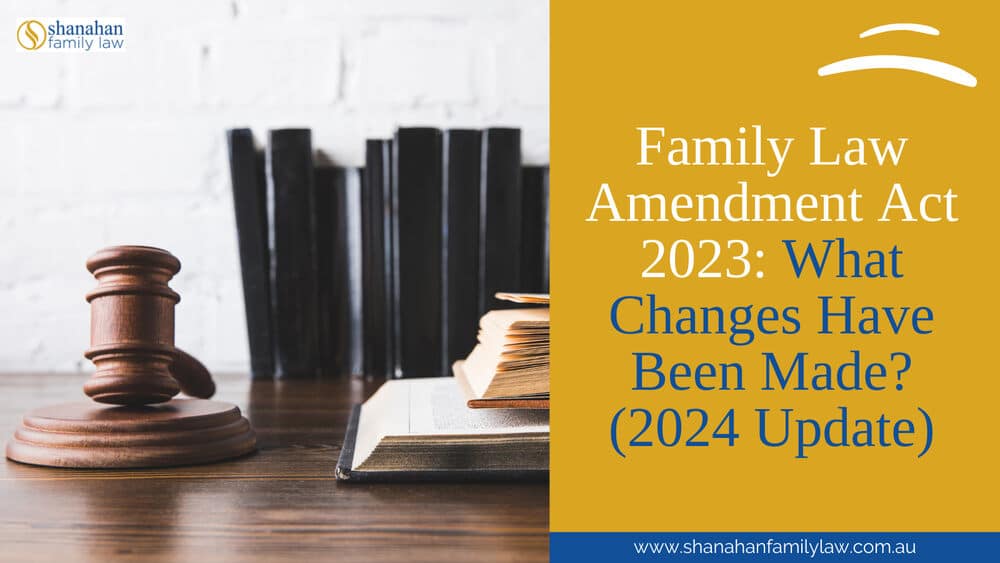
The government passed a family law amendment bill in October 2023. The amendment affects how the Family Law Act regulates parenting orders. The changes came into effect on 6 May 2024.
Let’s look at what changes were made and how they could affect you.
Family Law Amendment Act 2023
The amendment that came into effect in May is the Family Law Amendment Act 2023. It may have vital implications for you if you have a parenting matter before the Court.
What’s changed?
The most significant changes to the family law system involve two matters:
- What the Family Court considers when settling parenting matters in the child’s best interests.
- How parents should make decisions regarding long-term issues for their children.
What the Court considers
The Court now uses 6 factors to determine what parenting arrangements are in a child’s best interests during family law proceedings.
- Preventing the child from suffering physical or psychological harm. The Court will consider issues such as any history of family violence. This will include accounting for any existing or previous domestic violence protection orders.
- The views of the child. The weight given to this factor will depend on the child’s maturity and ability to express their view.
- The child’s developmental, psychological, emotional and cultural needs.
- Each parent’s ability to fulfil their child’s developmental, psychological, emotional and cultural needs. This may include factors like each parent’s financial position and their geographic proximity to their child.
- How beneficial it is for the child to have a relationship with both of their parents. The Court will also consider the benefits of the child maintaining a relationship with people other than their parents who are significant to them. This generally includes any brothers and sisters as well as extended family such as grandparents, aunts, uncles and cousins.
- Any other factors that the Court considers relevant to the matter.
There is an additional factor for Aboriginal and Torres Strait Islander families. The Court wants to help protect Indigenous culture. To this end, the Court will consider what parenting arrangements will best facilitate the child’s connection with their cultural heritage.
When applying for parenting orders, it’s vital that you provide reasons why the order is in your child’s best interests.

Making long-term decisions
The Court will often decide on how co-parents are to make long-term decisions regarding their children. These decisions can relate to issues such as the child’s cultural needs, healthcare, religious instruction and education. Prior to the amendments, the Court would begin from a presumption of equal shared parental responsibility being best for the child. This is no longer the case.
If the Court mandates joint decision-making, parties will be required to consult with each other. Parents are expected to make a genuine effort to come to a mutual agreement on behalf of their children. While the Court doesn’t assume equal shared parental responsibility benefits, it still wants to encourage parents to make decisions together.
This arrangement may be formalised through a parenting order, parenting plan, or parenting consent order. Collaboration isn’t expected if it would be unsafe to do so.
What parenting orders do the amendments affect?
What these amendments mean for outstanding family law matters depends on where you are in the process. The amendments don’t automatically apply to existing parenting orders. The changes will apply to new and existing proceedings unless the final hearing commences before 6 May 2024.
However, there may be exceptions. Getting advice from family law professionals is crucial to understand how the amendments affect your circumstances.
Conclusion
The new amendment changes how the Court determines what’s in a child’s best interests and how parents are to approach long-term decisions for their child. Existing parenting orders aren’t affected, unless there are exceptional circumstances. An ongoing proceeding must satisfy the amendment unless the final hearing is underway by 6 May 2024.
If you want advice on the Family Law Amendment Act, our family law practice can help.
If you need help with family law matters, contact us for a free discovery call.
Related Articles
- The Benefit of Building Strong Legal Partnerships with Family Law Clients
- Client Success Stories: How Shanahan Family Law Produces Positive Results In Divorce Cases?
- Why Our Family Law Services Approach Is the Best Choice for You?
- 7 Tips on How to Choose the Best Family Lawyer
- Know the Important Updates in Family Law Court of Australia

